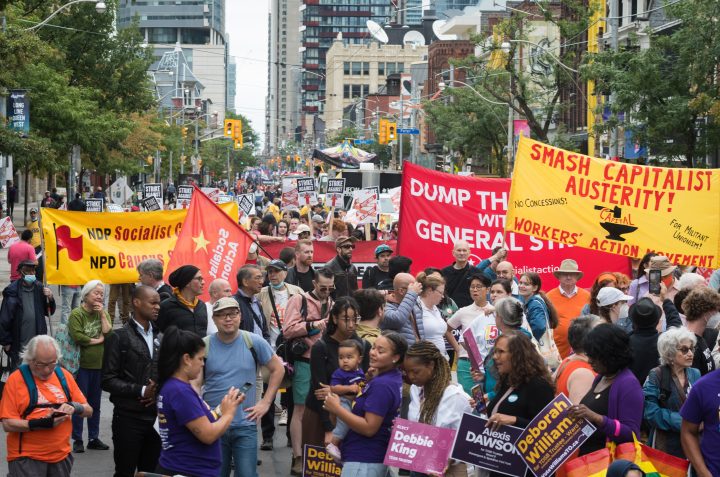TORONTO — Union leaders praised the newest generation of Canadians to enter the workforce on Labour Day Monday, saying the youthful cohort’s priorities — combined with changing standards ushered in by the COVID-19 pandemic — are doing much to revitalize the country’s labour movement.

Younger employees are entering the workforce in large numbers, they said, and are offering perspectives and voicing priorities that often differ from those expressed by older generations.
Some of that fresh energy was on display at Toronto’s Labour Day parade, which returned to the city’s downtown streets for the first time since the onset of the pandemic.
Chants, horns, drums, pop music and the strains of bagpipes filled the air in downtown Toronto as hundreds of workers and dozens of unions showed their support for the workers’ movement.
After speaking at a rally in downtown Toronto’s Nathan Phillips Square, Unifor National President Lana Payne said members of Generation Z, such as her 21-year-old daughter, are bringing an important new lens to the labour movement.
“They’re revitalizing us, that’s the reality,” said Payne. “It sends a message that we have to have balance in our lives, we have to be able to have a life outside of work and we have to be able to have dignity and respect in our workplaces.”

Get breaking National news
Payne said the labour movement is seeing increased growth around the world and unions are being emboldened to take on big corporations like Amazon, Google and Starbucks because the pandemic redefined the value of work.
“People started to see that they were valuable to our society and to our economy, and not necessarily getting the respect that they deserved for that work.”
Other labour leaders suggested the trend is alive and well in Canada, too.
Bea Bruske, president of the Canadian Labour Congress, said she is seeing more young workers organizing in the workplace and signing union cards.
“I think some of the achievements and milestones over the last little while is a renewed interest that workers have of taking power in their workplace right of organizing… of understanding that working in solidarity, they can achieve greater things,” said Bruske. “The pandemic has shown workers that is the case.”
According to Payne, the prevalence of such attitudes is exemplified by recent discussions about so-called “quiet quitting.”
Though definitions vary, quiet quitting essentially refers to clocking in when you’re expected to, doing your assigned tasks, leaving on time and not taking on extra work outside your regular hours. It’s not about slacking off on the job, but rather setting boundaries and preventing burnout.
But Payne argued quiet quitting is an individual action that won’t solve the problem of unfair conditions in the workplace long-term.
“The way you do that is to join a union, have collective power in your workplace, bargain a collective agreement, make sure your working conditions are better and do it as a collective,” she said. “Because, chances are your co-worker is feeling the same way you are.”
Donovan Ritch, an organizer with youth labour advocacy group Fightback, said there’s been a significant wave of workers unionizing in recent months. More than 220 U.S. Starbucks stores have voted to unionize since late last year, and Ritch said the sentiment is spreading to Canada.
“This is a sign that workers that are not organized are more favourable to unions than they have been in multiple generations, and many of them are actively taking steps to organize unions,” he said.
Ritch said quiet quitting is also a form of job action, whether workers realize it or not.
“Workers are sick and tired of being exploited, having to work long hours and being made to do all this extra work and not being paid for it,” he said.
“The younger generation, they don’t know a lot about what unions are and what they can do, but they’re learning that they need to take action in some form.”
— With files from Nojoud Al Mallees in Ottawa







Comments
Want to discuss? Please read our Commenting Policy first.